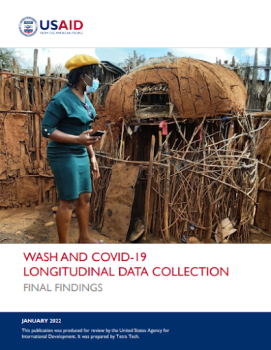In 2020, the United States Agency for International Development (USAID) Water, Sanitation, and Hygiene Partnerships and Learning for Sustainability (WASHPaLS) project conducted a rapid assessment and forecasting analysis of the effects of the novel Coronavirus Disease 2019 (COVID-19) pandemic on access to water, sanitation, and hygiene (WASH) services and products in USAID high priority (HP) and strategy-aligned countries. In 2021, USAID tasked WASHPaLS with collecting and presenting available longitudinal data on the effects of COVID-19 on access to WASH services and products in USAID HP countries.
This task included the collation of available longitudinal data on the impacts of COVID-19 across three priority topics: WASH governance, WASH in households, and small-scale service providers (SSSPs). For each of the three topic areas, we identified indicators common across existing data collection initiatives (16 for governance, 12 for households, 14 for SSSPs). Secondary data collection consisted of aggregating existing, publicly available data that included any of the selected indicators, identified during an initial data scan. Primary data collection was used to fill gaps in the availability of data and consisted of quantitative household surveys for the WASH in households topic and mixed-method data collection for the governance and SSSP topics (informant interviews, online surveys).
This document represents the synthesis of the assessment carried out by the WASHPaLS team between March and December 2021.


